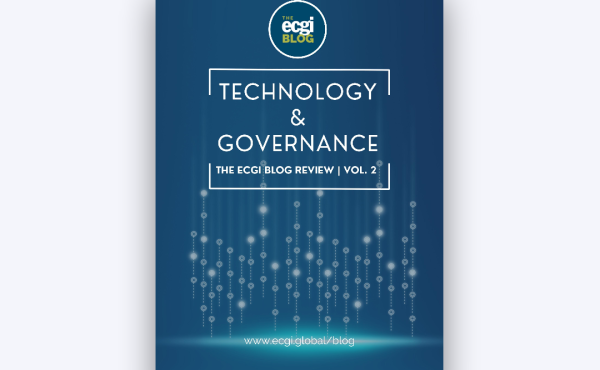
The ECGI blog is kindly supported by

Blockchain: A new frontier for governance scholars
Blockchain technology has many promising applications, such as payment systems, contracts, and financial services. But unfortunately, blockchains also have a dark side, such as gambling, tax evasion, money laundering, and (in some cases) environmental costs. In a nutshell, a blockchain is a public good with social benefits and costs. These features make the study of blockchains an exciting new area for governance scholars.
A blockchain is a collection of records – called blocks – that are linked together using cryptography. More broadly, a blockchain system has three defining components:
- A database with blocks of transactions.
- A set of rules (a protocol) and source code for block production and validation.
- A governance structure for allocating decision-making rights.
Blockchains differ in technical aspects, applications, and rules. Those who control decisions can change all these aspects. Governance – who decides what – is what matters in the end. Blockchains with the same technology can adopt different governance structures. Ultimately, the defining aspect of a blockchain is its governance structure.
We can think of public blockchains as large-scale experiments with innovative governance structures.
A permissionless (i.e., public or open) blockchain is a public service with diffuse ownership. There are no shareholders but multiple stakeholders, such as users, developers, miners, etc. We can think of public blockchains as large-scale experiments with innovative governance structures. Like most political and corporate governance systems, blockchain governance relies on a combination of voice and exit. Thus, while blockchains are arguably novel organisational forms, the governance problems they face are well known to governance scholars. In particular, blockchains suffer from significant coordination and collective action problems and are subject to network effects.
The emergence of blockchains provides many opportunities for public and corporate governance scholars, who have much to contribute to the study of this new organisational form. On the theoretical side, blockchains are natural applications for voting, contracting, competition, and coordination models. On the empirical side, blockchains offer researchers opportunities to work with new, free, and publicly available data on experimental governance structures.
To understand some of the issues with blockchain governance, let's first consider the most famous blockchain: The Bitcoin blockchain, which implements a digital currency called bitcoin (BTC). The Bitcoin protocol is implemented through software. The dominant version of this software is called Bitcoin Core. Note that the fact that a dominant software version exists is in itself interesting; it raises the question of how a truly decentralised network achieves coordination.
Bitcoin has many stakeholders who work in its infrastructure. A relatively small group of people, called core developers, maintains and improves Bitcoin Core. Others are responsible for block production (i.e., adding transaction data to the ledger); they are called miners. Finally, full nodes are responsible for block validation and database storage.
Bitcoin is said to be decentralised because – at least in principle – anyone can become a developer, miner, or node operator. Also, there is no limit to the number of developers, miners, or nodes. How are developers, block producers, and validators chosen? How are they monitored? How are changes to the protocol decided? These are just some of the challenges the blockchain community faces in practice.
Despite some confusing statements by blockchain enthusiasts, both the ledger and the blockchain code can (and often do) change. Unlike what is often said, code is not law.
Consider first the case of developers. The vast majority of Bitcoin holders are not software developers. Yet, in one way or another, blockchain users have to trust a small group of developers who maintain the blockchain and regularly change its protocol. Despite some confusing statements by blockchain enthusiasts, both the ledger and the blockchain code can (and often do) change. Unlike what is often said, code is not law. Core developers play a crucial role by proposing changes to the blockchain code and, more significantly, by vetting and implementing some changes but not others. Because developers need to have technical expertise, blockchains are, to a large extent, technocracies.
One could argue that the free entry of developers implies that we need not worry about their incentives. This argument is flawed. A significant investment in specific knowledge is required to become a developer. Most people are not willing or able to make such investments. Most developers are blockchain enthusiasts and, thus, prone to think alike. Private companies fund a few star developers. For example, Jack Dorsey's Block (formerly known as Square) has invested heavily in funding Bitcoin developers and projects. A natural question is what such companies get from paying developers who work in a notionally decentralised network.
Blockchain enthusiasts usually argue that we do not need to worry about conflicts of interest because "there are too many nodes and miners." This argument is a fallacy.
Similar issues arise with miners and validators. Blockchain enthusiasts usually argue that we do not need to worry about conflicts of interest because "there are too many nodes and miners." This argument is a fallacy for (at least) three reasons:
- Miners and validators are not representative of a blockchain's user base. There are far many more users than nodes and miners.
- Many miners and node operators are for-profit businesses with their own interests, such as crypto exchanges or mining hardware producers. They may enjoy private benefits beyond the public value of a blockchain.
- The total number of nodes and miners may not matter if they all have similar incentives, preferences, and biases.
Many blockchain researchers and enthusiasts espouse a utopian view of blockchain governance. According to this view, a combination of clever mechanism design and algorithmic implementation can create flawless governance structures. If only we could get the game theory right! Most governance scholars would consider such a view naive. There are severe limits to mechanism design in practice: innovation, unforeseen contingencies, complexity, lack of commitment, coordination problems (i.e., multiple equilibria), human fallibility, and less-than-rational subjects. On top of all that, why would computer scientists be infallible mechanism designers?
In sum, blockchain research offers numerous opportunities for governance scholars. First, we can use the tools and ideas from corporate governance research to study blockchain governance. Second, blockchains are governance experiments from which we could also learn lessons for corporate governance. Finally, governance is our trade; let coders code!
--------------------------------
By Daniel Ferreira, Head of Department and Professor of Finance at the London School of Economics, ECGI Fellow and Research Member.
This article reflects solely the views and opinions of the authors. The ECGI does not, consistent with its constitutional purpose, have a view or opinion. If you wish to respond to this article, you can submit a blog article or 'letter to the editor' by clicking here.






